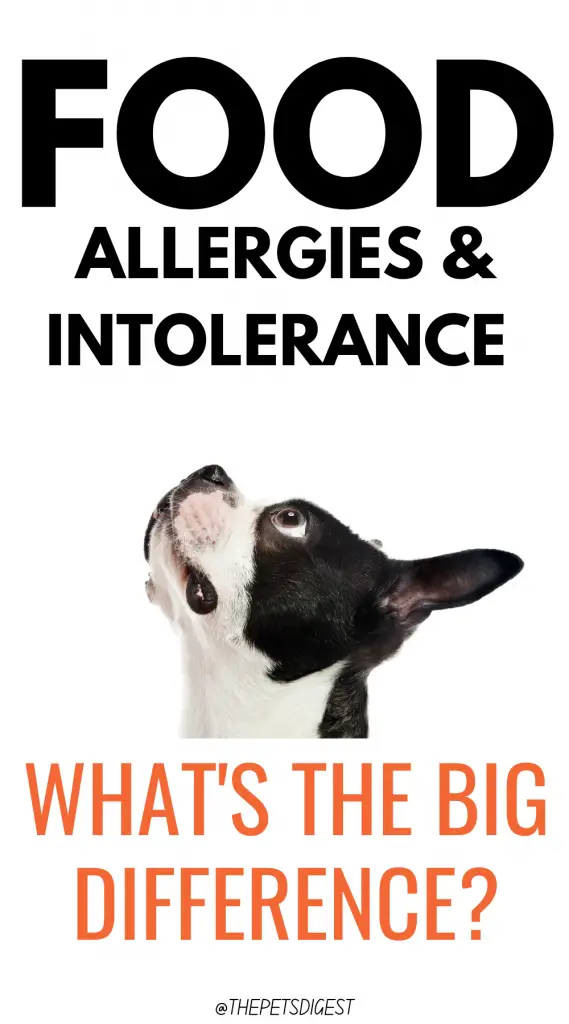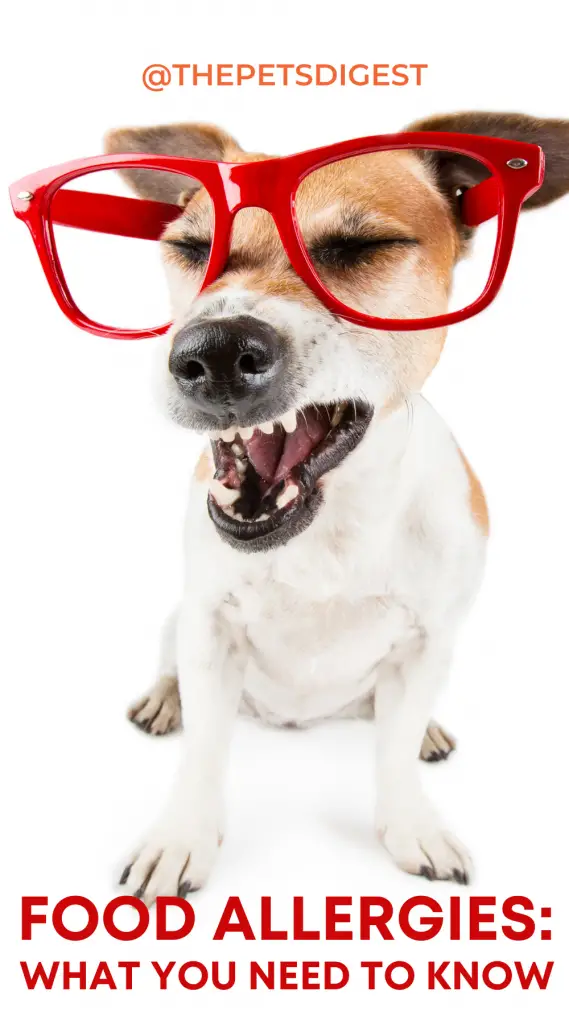While many of the symptoms and presenting clinical signs of pet food intolerances in dogs and cats and pet food allergies in your pet are similar, these food sensitivities have vastly different processes and can have drastically different outcomes.
True food allergies are actually pretty rare in pets. Food sensitivities are approximately 10-15 times more commonplace than food allergies. So, if you have a dog that is scratching incessantly or has some stomach issues it is probably due to a food intolerance/sensitivity and not an allergy.
Among pets, food allergies are less common than airborne allergies so also have your pet checked for other types of allergens.
Let’s compare the two food sensitivities in dogs and cats.

DOG AND CAT FOOD INTOLERANCE
What is dog and cat food intolerance?
Dog and cat food intolerance is when your pet is unable to tolerate something in the food. As opposed to the long-term duration that comes with food allergies, dog and cat food intolerances are almost always immediate reactions. Pet food intolerances can be caused by too much or too little fiber, too much fat.
Food intolerance in dogs and cats usually occurs when your pet is unable to properly break down, or digest their food. Most dogs will present with dog food intolerance diarrhea. Think of it like being lactose intolerant, many people can not digest lactose and it results in gas and stomach upset. It is not necessarily an allergic reaction.
What breeds are more prone to food sensitivities?
Any breed can develop food sensitivities, but there may be an increased risk for Labrador Retrievers, West Highland White Terriers, and Cocker Spaniels. (Source)
What foods most commonly cause food intolerances or sensitivities?
The foods dogs are most often allergic to include:
- beef
- chicken
- eggs
- corn
- wheat
- soy
- milk
Once the offending allergens are identified they should be strictly avoidance. If your dog is allergic to other things (such as plant pollen or fleas), identifying underlying food allergies will be harder. Infrequently, a dog will react to new food insensitivies as it ages and you will have to identify and avoid these foods.
How is dog and cat food intolerance diagnosed?
Cat and dog food intolerance symptoms are usually limited to gastrointestinal symptoms like vomiting and diarrhea, there may be some malaise or lethargy noted after your pet eats certain foods. Many times owners are able to tell what is causing their fur baby some discomfort and will go to the vet for confirmation.
There are at home tests that can be used to help in the detection of food intolerances. While the technology is still evolving there have been amazing strides taken like the NutriScan saliva-based diagnostic system for food intolerance/sensitivities pictured below.
How are dog food intolerances treated?
The only way to rid your pet of having further reactions is to determine and remove the offending culprit. If your dog has a disease like pancreatitis or irritable bowel syndrome the culprit is usually fat, so feeding a life-long low-fat diet may be necessary.
DOG AND CAT FOOD ALLERGIES
What are food allergies in pets?
While some of the symptoms of pet food allergies can be the same for dogs and cats, these food allergies occur when your dog or cat’s immune system determines that the protein from the food they eat is invasive and something that needs to be attacked.
Your pet’s body produces antibodies against the food they are eating. This ends in a response that can be exhibited in various ways such as seriously itchy skin, constant ear infections, gastrointestinal upset, and excessive licking. Think of food allergies in dogs the same as in people, if someone is highly allergic to peanuts it can cause hives, swelling, and itchiness almost immediately. This is the same way with your dog, it usually is something that is acute or causing a more immediate immunological response as opposed to food intolerances which are usually chronic or ongoing issues that build up over time
The most common food allergens are chicken, beef, lamb, dairy products, soy, and gluten. Although these are the most common in the United States, dogs that regularly eat other types of protein may not share the same allergens. Also, it is not only proteins that some pets become allergic to, although much rarer pets can be allergic to grain or other food additives as well.
How are dog and cat food allergies diagnosed?
Although there are allergy tests available that can be done by your veterinarian or on your own via an at-home test. They aren’t always accurate and there really isn’t any easy way to determine what your pet is allergic to.
There have been multiple studies that show that the food allergy test done on dogs and cats are not the gold standard for diagnosing food allergies in dogs. In fact, one article stated that the commercial diet, skin testing, and anti-IgE ELISA cannot replace an owner-prepared food elimination diet for food hypersensitivity testing in dogs. Most vets will agree that the gold standard for diagnosing food allergies in pets is to do a food trial or dietary elimination trial. If you want to learn more about doing a food trial read my article here.
How are food allergies in pets treated?
Many times your fur baby will be placed on an extremely strict diet with a novel protein and usually a prescription diet at least initially. Since your dog has never eaten this protein (usually kangaroo or bison) their bodies will most likely not react to them. However, owners should always be aware that sensitivities to these proteins can eventually occur, which means there are no diets that are completely hypoallergenic.
There are some pets that do well on a veterinary-prescribed hydrolyzed diet. Hydrolyzed dog food simply means the protein has been broken down chemically into much smaller sizes so the immune system does not react to them. This is probably the closest you can get to a completely hypoallergenic diet.

What are good meds for skin issues in my dog?
While you don’t want to give any medication like steroids while you are doing a food trial or testing for the possible culprit many times vets will put dogs on a medication like Apoquel.
Apoquel
A once-daily treatment for canine atopic dermatitis, providing relief from allergic itch without the side effects of steroids. This is a prescription medication and owners will usually give it for 7-14 days then use a maintenance dose
Antihistamines
Antihistamines like Benadryl are given at times via injection or oral, although this is not something that you should do long-term
Steroids
Some vets will prescribe steroids for allergies if they are severe enough, this is something that should be tapered if given orally and preferably not used for long durations
What are good hypoallergenic diets for dogs and cats?
Most foods designated hypoallergenic or hydrolyzed will work well for a dog that has some food sensitivities and often times it is up to the dog or cat and what they will eat. Royal Canin has a good line of foods for allergies, I would begin with the Royal Canin Hypoallergenic or Royal Canin hydrolyzed diets.
References
- Measurement of allergen-specific IgG in serum is of limited value for the management of dogs diagnosed with cutaneous adverse food reactions
- Diagnosis of food allergy in dogs
- Diagnostic testing of dogs for food hypersensitivity
- Canine Nutrigenomics























































































































